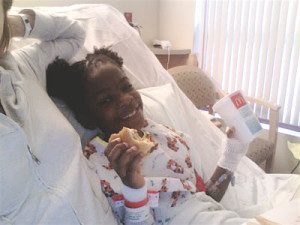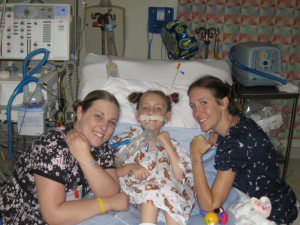Nearly three years ago, I almost lost my eldest daughter. It was one of those incredibly scary times where your adrenaline is pumping for days before you are able to calm down enough to even cry.
At the time, she was 6 years old and had a bad mix of poor body awareness and a high pain tolerance. What I thought the nurse on call would tell me was “just a flu bug” ended up getting us admitted into the hospital in the middle of the night. A little throwing up and fever was actually a ruptured appendix. If we had waited to call the nurse or delayed in any way in getting to the hospital, it would most certainly have been fatal.
There was one unexpected ray of sunshine in that dark and uncertain time. She was called a “Child Life Specialist,” a liaison of communication between your child and the medical staff. She brought understanding and fun to our family during our 9-day-long stay.
I hope something like this never happens to you. If it does, though, I thought you’d like to hear more about this treasure you’ll find in the hospitals. Here my friend, Jenni, shares her own words about the job she loves. Here she is pictured on the right with one of her special patients.
I know this isn’t something you can just jump into. What type of training through the hospital did you have to become a CLS?
Most child life specialists have their bachelors/masters in child development, family studies, counseling or psychology. I actually have my degree in elementary education but I figured out during my student teaching that I didn’t want to be in the classroom. To become a child life specialist one has to complete a 600 hour internship in a pediatric hospital setting. In order to be considered for an internship, you have to have a minimum of 150 volunteer hours in a pediatric hospital setting, at least 10 courses approved through the National Child Life Council that pertain to Child Life and complete at least one college course taught by a Child Life Specialist. The hospital internship is full time for three months, unpaid. It prepares you for your career as a Child Life Specialist. Once the internship is complete, you sit for a certification exam. Certification has to be kept up and renewed every five years with continuing education classes and conferences.
Wow. That’s amazing! Walk me through a day in the life of a CLS?
Every single day is completely different, which is one the the reasons I love my job. It keeps me on my toes and keeps things from getting monotonous. I cover the Pediatric Intensive Care Unit. We have patients there that are long term and patients that are there for just a few days. We sees post-ops for neurosurgery and other complicated surgeries, a lot of traumas, very sick oncology patients, children with respiratory distress, and everything in between. I cover a 24 bed unit. Ideally, I would love to see every patient and family every day, but I don’t always have the opportunity to do so. I prioritize my day based on what is happening that day with each patient. Do I have a patient going to surgery that I need to prepare them for? Is there a patient with a new diagnosis that needs education and support? Are there procedures happening on the unit that I need to be present for? Are there any siblings visiting today that need preparation before they see their brother or sister? Is there a patient dying today that needs sibling support and hand prints/footprints for memory making? I can also utilize our child life assistants, who run the playrooms, and our volunteers for help on my unit. On top of these things we all have committees that we’re a part of, special events to run, donations to collect, interns to supervise, etc. So every day is completely different.
You mentioned siblings, what do you do for siblings?
Family centered care is becoming a huge focus for many hospitals. My job is helping patients cope with being in the hospital, and this includes helping families cope as well. During education sessions with the patient, I involve parents and siblings, too. I use a lot of different dolls and pictures with my teachings. So for example, if a patient is getting a port placed, I will show them the port on a doll, what it looks like and how it works. I’ll also enlist the siblings to help decorate their brother or sisters room to make it feel more comfortable and this also helps siblings feel involved in their brother or sister’s hospitalizations. During RSV reason, when siblings under 12 can’t visit, I help parents with ideas of how to connect with their children at home while they’re at the hospital with their child. During bereavement, parents and siblings are invited to take part in memory making, if they’re comfortable to do so. They typically help with hand prints, footprints, locks of hair, memory boxes, etc. It’s important to involve the whole family in the hospitalization, for both the patient and for the family members. Siblings typically get overlooked when their brother or sister is hospitalized, and my goal is to keep that from happening as much as possible.
As an entire family, we dumped a lot on our CLS. How do you personally handle the emotional stress of working day in and day out with hurting or sick children?
There is a healthy balance in this job, between being compassionate and caring towards the families and not taking their sorrow and trauma on as your own. Self care is extremely important..taking care of yourself, recognizing signs of burn out, and taking action prior to burn out. It’s very easy to put up a huge wall to close off any emotion related to this job, which I have done in the past and have observed others in the health care team do as well. But I believe that doing so blocks out any compassion one may have to offer the families we work with. I want to be able to provide compassionate support to the families I work with while still keeping healthy boundaries for my own well being. Like I said, it’s a fine line and a balance that doesn’t come easily, one that I’m definitely still learning at times.
What is your favorite part of your job?
The best part of my job…I get to be the safe person and, at times, the fun person. This tends to allow for quick rapport building with patients and siblings. My work is based around play…developmental play for kids who are stuck in the hospital, regular daily play to give kids a sense of normalization, medical play to assist them in becoming familiar with their surroundings and to help educate them about procedures, surgeries or a new diagnosis. Kids are resilient and amazing…they’re usually up for something fun, even if they’re not feeling well. I also like to talk the kids into playing jokes on their nurses or doctors, when they’re feeling up to it. I keep a lot of fake poop, fake vomit and fake cockroaches around. So despite the serious environment, I get to play and have fun with the kids, at times. It’s a very fulfilling job.
Thanks, Jenni!! I hope none of our readers ever have to meet you while on the job, but it is comforting to know that you and other Child Life Specialists are available in those hard times.





















Wow! That’s amazing! Thanks for sharing!!
I really enjoyed reading this! In fact, I’ve shared the link with a college-aged friend who I think would be an incredible Child Life Specialist 🙂 Thanks, Cate!
that is awesome, Annie. It takes a special person to do this job that few would thrive in! 🙂
Comments are closed.